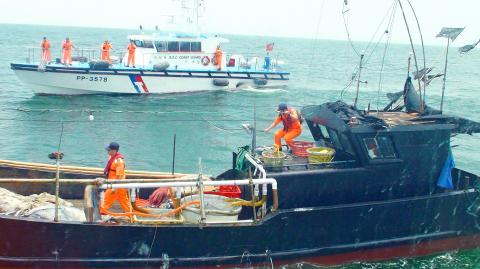Matsu authorities on Monday set up a platform as part of their efforts to crack down on criminal activities, the Lienchiang District Prosecutors’ Office said.
The platform was set up due to growing abuse of the islands, which are less than 20km from China’s coast, as a transit point for people and goods from China trying to enter Taiwan illegally, the office said in a statement.
Local authorities have over the past six months handled six cases involving dozens of stowaways, one human trafficking case, two cases of poaching sea sand, six cases of illegal fishing and several cases of mushroom and cigarette smuggling, the office said.

Photo: Yu Chao-fu, Taipei Times
Attempts by stowaways to enter Taiwan through the Matsu Islands have been on the rise, affecting local social order and posing a threat to national security, Chief Prosecutor Yu Hsiu-duan (俞秀端) said, without providing any details.
In the past, stowaways often used intermediaries at sea to pick them up and take them to Nangan (南竿) or Xiju (西莒) islands to wait for an opportunity to sneak into Taiwan proper, she said.
However, Chinese have been sailing directly to Dongyin (東引) and Beigan (北竿) islands before proceeding to Taiwan proper with fake documents through the help of human trafficking rings, she added.
Some Taiwanese criminals have also used the Matsu Islands as a transit point to enter China with false documents, Yu said.

The Ministry of Foreign Affairs (MOFA) yesterday voiced dissatisfaction with the Comprehensive and Progressive Agreement for Trans- Pacific Partnership (CPTPP), whose latest meeting, concluded earlier the same day, appeared not to address the country’s application. In a statement, MOFA said the CPTPP commission had "once again failed to fairly process Taiwan’s application," attributing the inaction to the bloc’s "succumbing to political pressure," without elaborating. Taiwan submitted its CPTPP application under the name "Separate Customs Territory of Taiwan, Penghu, Kinmen and Matsu" on Sept. 22, 2021 -- less than a week after China

ALIGNED THINKING: Taiwan and Japan have a mutual interest in trade, culture and engineering, and can work together for stability, Cho Jung-tai said Taiwan and Japan are two like-minded countries willing to work together to form a “safety barrier” in the Indo-Pacific region, Premier Cho Jung-tai (卓榮泰) yesterday said at the opening ceremony of the 35th Taiwan-Japan Modern Engineering and Technology Symposium in Taipei. Taiwan and Japan are close geographically and closer emotionally, he added. Citing the overflowing of a barrier lake in the Mataian River (馬太鞍溪) in September, Cho said the submersible water level sensors given by Japan during the disaster helped Taiwan monitor the lake’s water levels more accurately. Japan also provided a lot of vaccines early in the outbreak of the COVID-19 pandemic,

Kaohsiung Mayor Chen Chi-mai (陳其邁) on Monday announced light shows and themed traffic lights to welcome fans of South Korean pop group Twice to the port city. The group is to play Kaohsiung on Saturday as part of its “This Is For” world tour. It would be the group’s first performance in Taiwan since its debut 10 years ago. The all-female group consists of five South Koreans, three Japanese and Tainan’s Chou Tzu-yu (周子瑜), the first Taiwan-born and raised member of a South Korean girl group. To promote the group’s arrival, the city has been holding a series of events, including a pop-up

A home-style restaurant opened by a Taiwanese woman in Quezon City in Metro Manila has been featured in the first-ever Michelin Guide honoring exceptional restaurants in the Philippines. The restaurant, Fong Wei Wu (豐味屋), was one of 74 eateries to receive a “Michelin Selected” honor in the guide, while one restaurant received two Michelin stars, eight received one star and 25 were awarded a “Bib Gourmand.” The guide, which was limited to restaurants in Metro Manila and Cebu, was published on Oct. 30. In an interview, Feng Wei Wu’s owner and chef, Linda, said that as a restaurateur in her 60s, receiving an